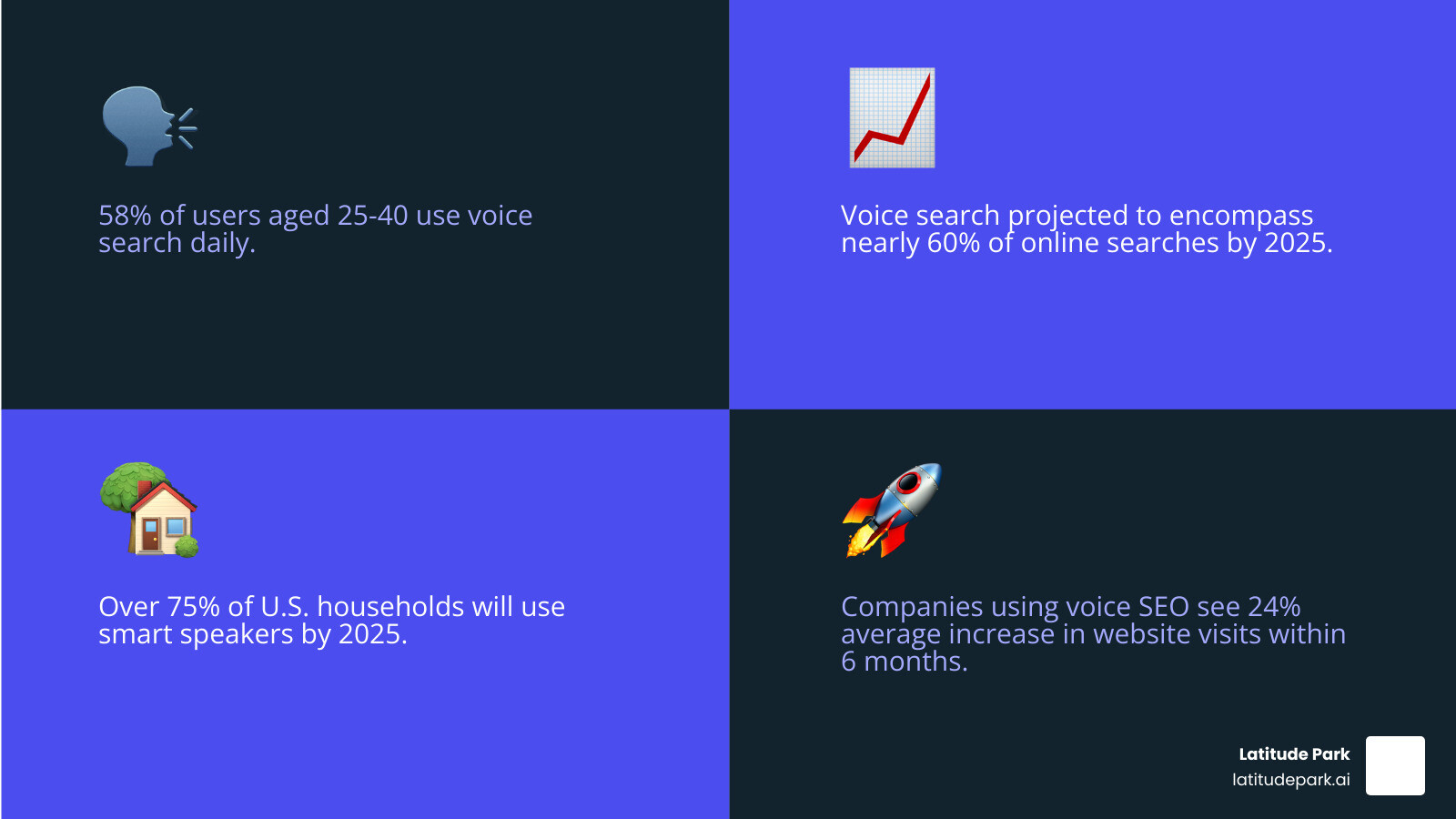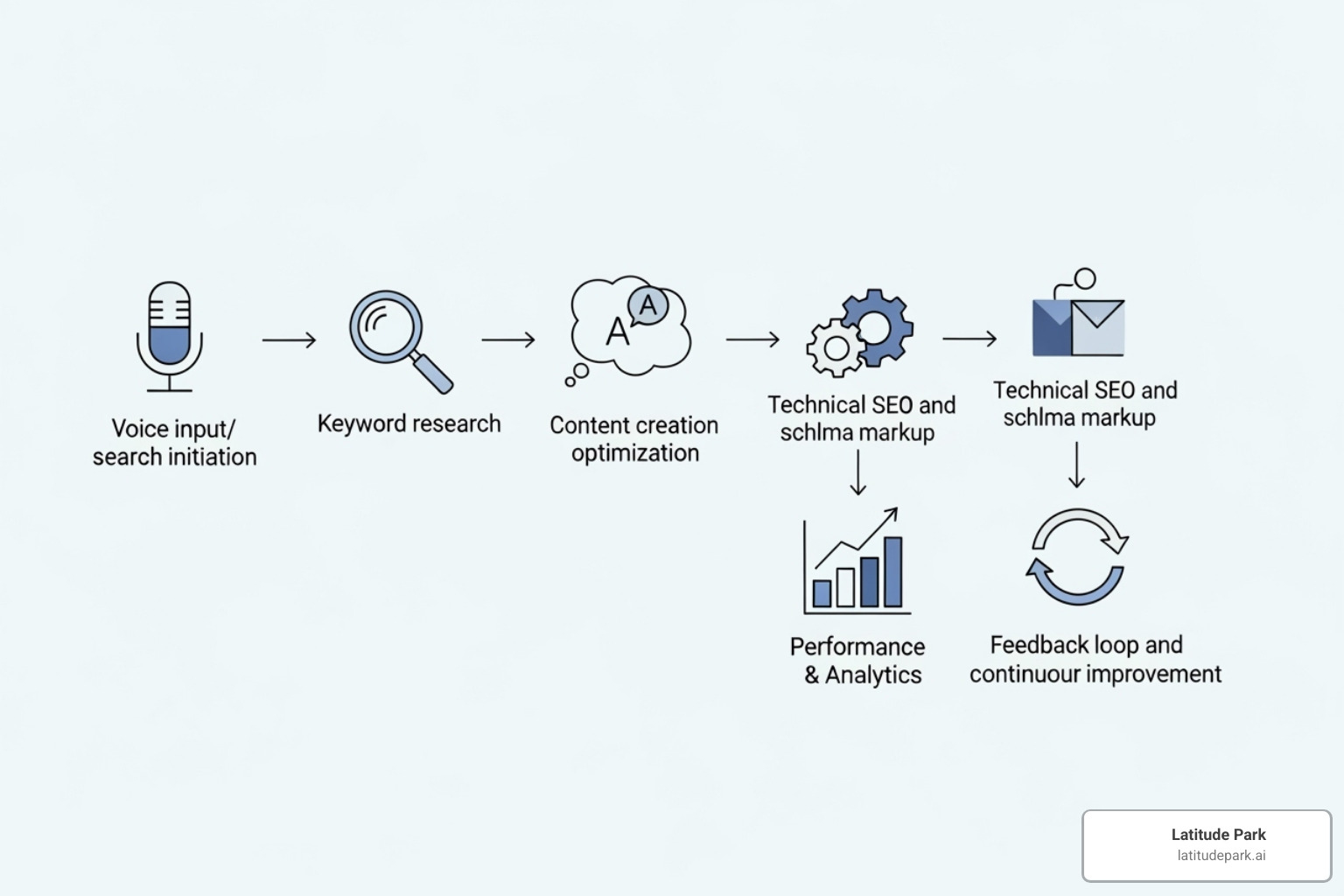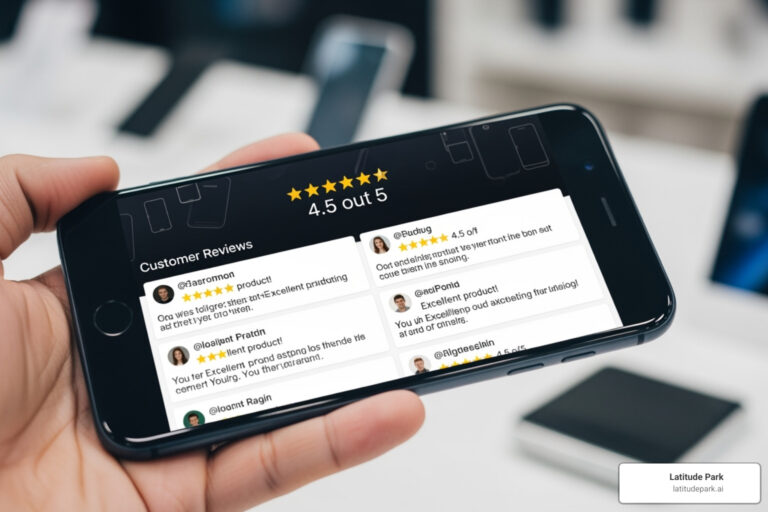Why Your Next Customer Will Speak, Not Type
Voice search optimization services are specialized digital marketing solutions that help businesses optimize their websites and content to appear in voice-activated search results from devices like smartphones, smart speakers, and in-car systems. With 58% of users aged 25-40 using voice search daily and projections showing voice search will encompass nearly 60% of all online searches by 2025, these services have become essential for businesses wanting to stay competitive.
Key Voice Search Optimization Services include:
- Conversational keyword research – targeting long-tail, question-based queries
- Content optimization – creating FAQ pages and natural language content
- Technical SEO – implementing structured data and speakable schema markup
- Local SEO improvement – optimizing for “near me” searches and Google Business Profiles
- Featured snippet optimization – positioning content for “position zero” results
- Performance tracking – monitoring voice search rankings and traffic
The numbers tell a compelling story: over 75% of U.S. households will use smart speakers by 2025, and companies integrating voice search optimization have witnessed an average 24% increase in website visits within six months. For franchise businesses managing multiple locations, voice search presents both an opportunity and a challenge – customers increasingly ask their devices “Where’s the nearest coffee shop?” rather than typing searches.
Voice search fundamentally changes how people find businesses. While traditional searches might use keywords like “pizza restaurant,” voice searches sound more like “Hey Google, where’s the best pizza place near me?” This shift toward conversational, local-focused queries means businesses need to adapt their digital presence accordingly.
I’m Rusty Rich, President and founder of Latitude Park, where I’ve helped businesses steer digital marketing evolution since 2009, including developing voice search optimization services for multi-location franchises. My experience building performance-focused marketing solutions has shown me that voice search isn’t just a trend – it’s the future of how customers find and connect with businesses.

The Anatomy of a Winning Voice Search Strategy
Building a successful voice search optimization services strategy isn’t just about speaking louder – it’s about speaking smarter. When someone asks Alexa “Where’s the best pizza place nearby?” instead of typing “pizza restaurant,” everything changes. The query is longer, more conversational, and expects an immediate, confident answer.
Think of voice search as having a conversation with a knowledgeable friend rather than shouting keywords into the void. This fundamental shift means we need to understand how voice assistants think, how people actually speak their questions, and most importantly, how to position your business as the definitive answer they’re seeking.
The winning formula combines voice-first indexing strategies with deep user intent understanding, all aimed at capturing those coveted direct answers that voice assistants love to share. When we get this right, your business becomes the voice that customers hear when they ask for what you offer.

Conversational Keyword & Content Optimization
Remember the last time you typed “weather Ottawa” but asked your phone “What’s the weather like in Ottawa today?” That difference is exactly why conversational keyword optimization has become the cornerstone of voice search success.
People speak differently than they type, and our content needs to reflect this reality. Instead of targeting choppy keywords like “plumber repair,” we focus on long-tail keywords and question-based queries that mirror real conversations: “How do I fix a leaky faucet?” or “Who’s the best plumber near me?”
The magic happens when we structure content around the who, what, where, why, and how questions your customers actually ask. This approach leverages natural language processing principles, helping voice assistants understand exactly what people need.
Creating robust FAQ pages becomes essential here. These sections directly address common voice queries in a conversational tone that feels natural when read aloud. About 71% of consumers prefer voice-placed queries over typing, showing just how much this natural interaction resonates with people.
The beauty of this approach is that it makes your content more human and accessible while simultaneously making it more findable through voice search. For deeper insights into crafting content that ranks, explore our guide on Creating SEO-Friendly Content: Tips & Best Practices.
Technical SEO for Voice-First Indexing
While great content gets you in the conversation, solid technical foundations ensure you stay there. Voice assistants are impatient – they need fast, reliable answers from websites that work flawlessly across all devices.
Mobile-first design isn’t optional anymore; it’s the entry ticket. Most voice searches happen on mobile devices or through smart speakers expecting lightning-fast responses. Your website must load quickly and function perfectly whether someone’s using a smartphone, tablet, or any other device.
Page load speed directly impacts your voice search visibility. Slow sites simply don’t get chosen by voice assistants who need to deliver instant gratification. We optimize every element to ensure your site responds as quickly as your customers expect.
Structured data and Schema markup act as translators between your content and search engines. This code helps voice assistants understand not just what your content says, but what it means. Speakable schema implementation goes one step further, specifically telling search engines which parts of your content work best when read aloud.
Website security through HTTPS provides the trust foundation that both search engines and users demand, especially when people are speaking personal queries. Learn more about building this crucial foundation in our article on What is Mobile-First Website Development?.
Local Voice Search Domination
Here’s where voice search gets exciting for businesses with physical locations. When 58% of US consumers use voice to find local businesses on smartphones, and 76% of smart speaker users perform local searches weekly, you’re looking at a massive opportunity.
“Near me” searches have exploded because voice makes asking for local help feel natural. People don’t type “restaurants 12345 zip code” anymore – they ask “Where’s the best Italian restaurant near me?”
Google Business Profile optimization becomes your secret weapon here. Every detail must be accurate and current because voice assistants pull directly from this information when recommending businesses. NAP consistency (Name, Address, Phone) across all online directories ensures voice assistants never get confused about your business details.
Geo-tagged images add another layer of local relevance, helping voice assistants understand exactly where you serve customers. For multi-location businesses and franchises, this becomes even more critical – each location needs its own optimized presence to capture hyperlocal voice searches.
The payoff is substantial: businesses optimized for local voice search see significant increases in foot traffic and phone calls from customers who heard about them through voice assistants. Our 7 Keys to Local Search Success provides comprehensive strategies for dominating local search.
Optimizing for Featured Snippets (Position Zero)
Featured snippets represent the holy grail of voice search because they’re where voice assistants find their answers. When your content wins position zero, you’re not just visible – you’re the voice that customers hear.
The statistics tell the story: 70% of voice search answers come from SERP features, with more than 40% pulled directly from featured snippets. Voice assistants source answers from these prime positions because they provide exactly the concise, authoritative information that spoken responses require.
Understanding the different types helps us optimize strategically. Paragraph snippets work perfectly for direct answers to specific questions. List snippets excel for step-by-step instructions or ranked items. Table snippets organize comparative information that voice assistants can easily interpret and share.
Success requires creating concise, factual content that directly answers common questions in your industry. We structure information to make it easy for Google to identify and feature, positioning your expertise as the definitive source for voice search answers.
This optimization creates a powerful ripple effect – winning featured snippets for voice search also boosts your visibility in traditional search results, amplifying your overall SEO performance. For comprehensive strategies on structuring your content for maximum impact, check out The Ultimate Guide to On-Page SEO.
What to Expect from Professional Voice Search Optimization Services
When you invest in professional voice search optimization services, you’re not just buying another marketing tactic—you’re positioning your business for the future of how customers find and interact with brands. Think of it as teaching your business to speak the same language as your customers, literally.

The change begins with your improved user experience. Voice search optimization naturally makes your website faster, more organized, and easier to steer. When we optimize for voice, we’re essentially making your content clearer and more accessible for everyone—whether they’re asking Siri for directions or typing on their laptop during lunch break.
Here’s where it gets exciting: higher conversion rates become the norm rather than the exception. Voice searchers aren’t just browsing; they’re ready to take action. When someone asks their phone “Where’s the best pizza place that delivers to my address?” they’re not researching for next month—they’re hungry now. By positioning your business to answer these high-intent queries, you’re capturing customers at the perfect moment.
The numbers speak for themselves when it comes to increased organic traffic. Companies that accept voice search optimization typically see an average 24% boost in website visits within six months. That’s not just more visitors—that’s more qualified visitors who found you through natural, conversational searches.
Your brand authority gets a significant boost too. When voice assistants consistently choose your business as the answer to customer questions, you become the trusted expert in your field. It’s like having a personal recommendation from everyone’s digital assistant.
Most importantly, you’re future-proofing your marketing strategy. With voice searches projected to represent nearly 60% of all online searches by 2025, optimizing now means you won’t be scrambling to catch up later. You’ll be ahead of the curve while your competitors are still figuring out why their phone traffic is declining. This strategic thinking is exactly why every business should have an SEO strategy.
Key Deliverables from Voice Search Optimization Services
When you partner with us for voice search optimization services, you get a complete roadmap custom specifically for your business needs. We understand that franchise businesses face unique challenges—each location needs to be findable, but the brand message must stay consistent.
Our comprehensive site audit reveals exactly where your website stands today and what opportunities we can open up. We dig deep into your technical foundation, content structure, and current search performance to create a clear starting point.
Through detailed competitor analysis, we uncover what’s working in your market and where gaps exist. This isn’t about copying what others do—it’s about finding your unique voice in the conversation.
Voice keyword research transforms how you think about what customers are searching for. Instead of “plumber,” we target “How do I fix a clogged drain fast?” or “Who’s the best emergency plumber near downtown?” This shift captures the real questions your customers are asking their devices.
Our on-page optimization makes your existing content work harder for voice search. We restructure headings, refine meta descriptions, and improve internal linking to help search engines understand exactly what you offer and when to recommend you.
Schema implementation might sound technical, but it’s really about translation. We add code that helps search engines understand your content so clearly that voice assistants can confidently share it as the answer to customer questions.
The content strategy development we provide ensures you’re not just answering questions—you’re answering them better than anyone else. We help create FAQ sections, optimize existing pages, and develop new content that directly addresses voice search queries.
Finally, our performance reporting keeps you informed about what’s working. We track your featured snippet ownership, voice search rankings, and organic traffic growth, so you can see exactly how your investment is paying off.
Voice Search vs. Traditional Text Search
Understanding the difference between voice and text search is like comparing a conversation with a friend to sending a telegram. Both get the job done, but they work completely differently.
Query length tells the whole story. When people type, they save time with shortcuts like “Italian restaurant near me.” When they speak, they use full sentences: “Where’s the best Italian restaurant near me that’s open right now and takes reservations?” Voice queries are naturally longer and more detailed.
User intent shifts dramatically with voice. Text searchers might be researching for later, but voice searchers usually want immediate action. They’re calling for directions, asking for phone numbers, or looking for solutions to problems happening right now.
The language style becomes conversational rather than mechanical. Voice searches include natural words like “the,” “a,” and “to” that people skip when typing. Questions dominate voice searches—”How,” “What,” “Where,” and “When” become your most important words.
Result format changes everything about how you need to optimize. Text search shows a list of options, but voice search reads one answer aloud. This means you need to be the single best answer, not just one of many good options.
Measuring Success: How to Track Your Voice Search ROI
The real magic of voice search optimization services happens when you can see the numbers climbing. Unlike traditional marketing where results can feel fuzzy, voice search optimization delivers measurable outcomes that directly impact your bottom line.
Think of it this way: every voice query answered by your content is a potential customer who found you first. But how do we prove that investment is paying off? The answer lies in tracking the right metrics.
Question-based keyword rankings tell us how well your content performs when someone asks their device a conversational question. Instead of watching rankings for “pizza restaurant,” we track how you rank for “Where’s the best pizza place that delivers?” These longer, more natural queries are where voice search users actually find businesses.
Featured snippet ownership is like having prime real estate in the digital world. When your content appears in that coveted “position zero” spot, voice assistants often read your answer aloud. We monitor how many of these golden snippets you’re winning, because each one represents dozens of potential voice search responses.
Mobile organic traffic analysis reveals another crucial piece of the puzzle. Since most voice searches happen on smartphones, we dig deep into your mobile traffic patterns. Are people finding you more often? Are they staying longer? The Upcity study on consumer voice search shows that 58% of consumers aged 25-34 use voice search daily, making this metric especially valuable for understanding your audience.
Google Search Console performance reports give us the inside scoop on exactly which voice queries are bringing people to your site. We can see the specific questions people ask, how often your site appears in results, and most importantly, how often they click through to visit you.
For franchise businesses, local search metrics are pure gold. We track phone calls triggered by voice searches, requests for directions, and website visits that started with someone asking “near me” questions. When someone says “Hey Google, find a hair salon nearby,” we want to know if they’re calling your location five minutes later.
The beauty of this data-driven approach is that it removes all guesswork. You’ll know exactly which voice search strategies are working and which need tweaking. This measurable success demonstrates The Importance of SEO in Digital Media Marketing for your long-term growth.
By continuously monitoring these metrics, we can fine-tune your voice search strategy, ensuring every dollar invested in optimization translates into real business results. Because at the end of the day, the best voice search strategy is one that brings customers through your door.
Frequently Asked Questions about Voice SEO
When businesses first learn about voice search optimization services, they naturally have questions. After helping countless franchises steer this evolving landscape, I’ve noticed the same concerns come up repeatedly. Let me address the most common ones to help you understand what voice SEO really means for your business.
How do professional voice search optimization services differ from standard SEO?
Think of traditional SEO as learning to write effective headlines for a newspaper, while voice SEO is like preparing for a natural conversation with a friend. Both aim to help people find your business, but they speak entirely different languages.
Standard SEO focuses on short, punchy keywords like “pizza delivery” or “car repair.” Voice SEO targets how people actually talk: “Hey Google, where can I get pizza delivered right now?” or “Who’s the best mechanic near me that’s open today?”
Voice search optimization services put much more emphasis on structured data and schema markup because voice assistants need to quickly extract clean, clear answers to read aloud. While traditional SEO might aim to get you on the first page of results, voice SEO aims to be the answer – that single response Alexa or Siri shares.
The technical priorities shift too. Mobile-first design and lightning-fast page speeds become even more critical since most voice searches happen on phones or smart speakers. Your Google Business Profile optimization becomes absolutely essential because voice users are often looking for immediate, local solutions.
The keyword research approach completely transforms. Instead of thinking about search terms, we think about full questions and natural language patterns. We anticipate the complete conversations users might have with their devices. For a deeper dive into search marketing differences, check out our guide on What is the Difference Between SEM and SEO?.
What industries benefit most from voice search optimization?
Some businesses are practically made for voice search success. If your customers often need quick answers or immediate local solutions, voice optimization can be a game-changer.
Local service businesses like restaurants, plumbers, hair salons, and auto repair shops see incredible results because 58% of consumers use voice to search for local businesses. When someone’s sink is leaking at 9 PM, they’re not typing – they’re asking their phone “Who’s an emergency plumber near me?”
Healthcare providers benefit enormously since people frequently ask health-related questions or need to find nearby clinics quickly. “Where’s the nearest urgent care?” or “What are the symptoms of strep throat?” are perfect voice queries.
The hospitality industry thrives with voice search because travelers naturally ask conversational questions: “What’s the best hotel downtown?” or “How do I get to the airport from here?” These queries happen constantly, especially when people are on the go.
E-commerce businesses might not see direct voice purchases yet, but voice search drives significant product research. People ask about reviews, compare features, and even reorder familiar items through voice commands.
Really, any business that regularly answers customer questions can dominate voice search. If you have an FAQ section on your website, you’re already sitting on voice search gold – you just need to optimize it properly.
How long does it take to see results?
I always tell clients that voice search optimization services work like planting a garden, not flipping a light switch. You’ll start seeing green shoots within a few months, but the full harvest takes time to develop.
Most businesses notice initial improvements within 3 to 6 months, depending on their current website authority and industry competition. If you’re a local business with decent existing SEO, you might see voice search traffic pick up even sooner. Multi-location franchises often take a bit longer since we’re optimizing across multiple markets simultaneously.
The timeline really depends on where you’re starting from. If your website loads slowly, lacks mobile optimization, or has minimal local SEO, we’ll need to build that foundation first. But once the groundwork is solid, voice search optimization builds momentum quickly.
SEO is fundamentally a long-term strategy for sustainable growth. The businesses that start optimizing for voice search now will have a significant advantage as voice usage continues growing. By 2025, nearly 60% of all searches will be voice-based, so getting ahead of this curve positions you perfectly for future success.
Every month you wait is another month your competitors might be capturing voice search traffic that should be coming to your business. For more insights on long-term SEO success, read our article How to Rank Higher on Google: 10 Effective Strategies.
Conclusion: Find Your Voice in the Future of Search
Voice search represents a fundamental shift in how people find and connect with businesses. It’s not just about technology getting smarter – it’s about customers becoming more conversational in their search habits. When someone asks their phone “Where’s the best coffee shop near me?” instead of typing “coffee shop,” they’re signaling a new era of search behavior that smart businesses need to accept.
Adapting to voice search is crucial for growth, especially as we watch traditional search patterns evolve. The numbers don’t lie: with voice searches projected to make up nearly 60% of all online queries by 2025, businesses that ignore this shift risk becoming invisible to a massive portion of their potential customers.
Here’s where it gets exciting for franchise owners and multi-location businesses. Voice search creates an opportunity to connect with customers conversationally – meeting them exactly where they are in their decision-making process. When someone asks “Find a plumber in my area” or “What’s the nearest pizza place that delivers?” they’re not just browsing. They’re ready to take action.
At Latitude Park, I’ve spent years helping franchise businesses steer complex digital marketing challenges. Our expertise in creating custom digital marketing strategies for franchises translates perfectly to voice search optimization. We understand that managing multiple locations means ensuring each one can be found when customers speak their local queries. It’s about making sure your brand is the clear, confident answer across all your markets.
The beauty of voice search optimization services lies in their ability to future-proof your marketing strategy while improving your current search performance. When we optimize your content for voice, we’re also strengthening your traditional SEO, enhancing user experience, and building the kind of authoritative online presence that converts browsers into buyers.
Ready to optimize your business for the spoken word? The future of search is happening now, and it’s time to make sure your customers can find you when they ask for what you offer. Explore our expert SEO services and let’s start a conversation about how we can help your business thrive in this voice-first world.









